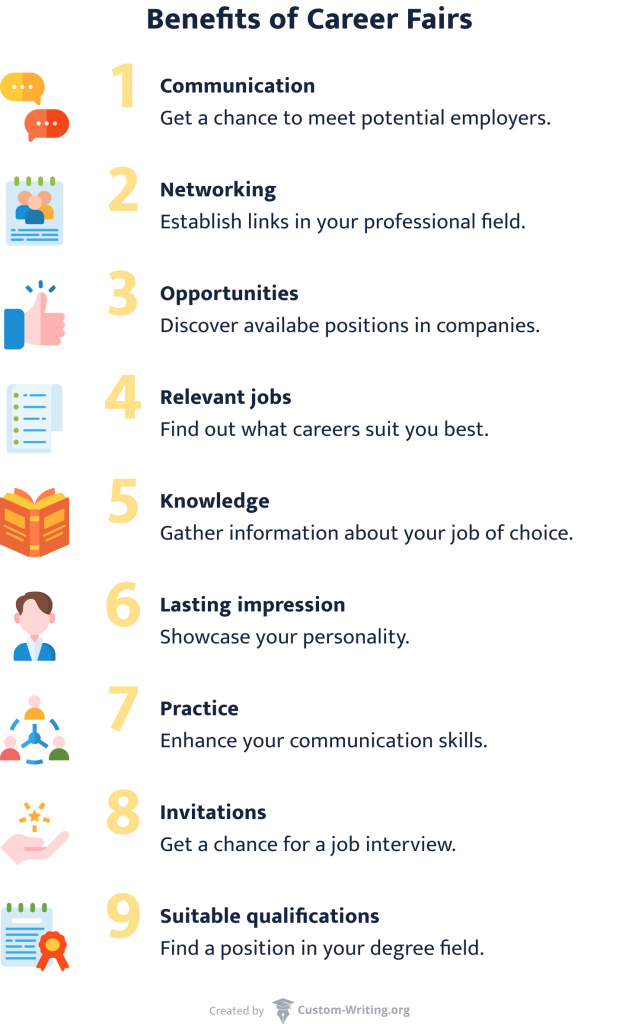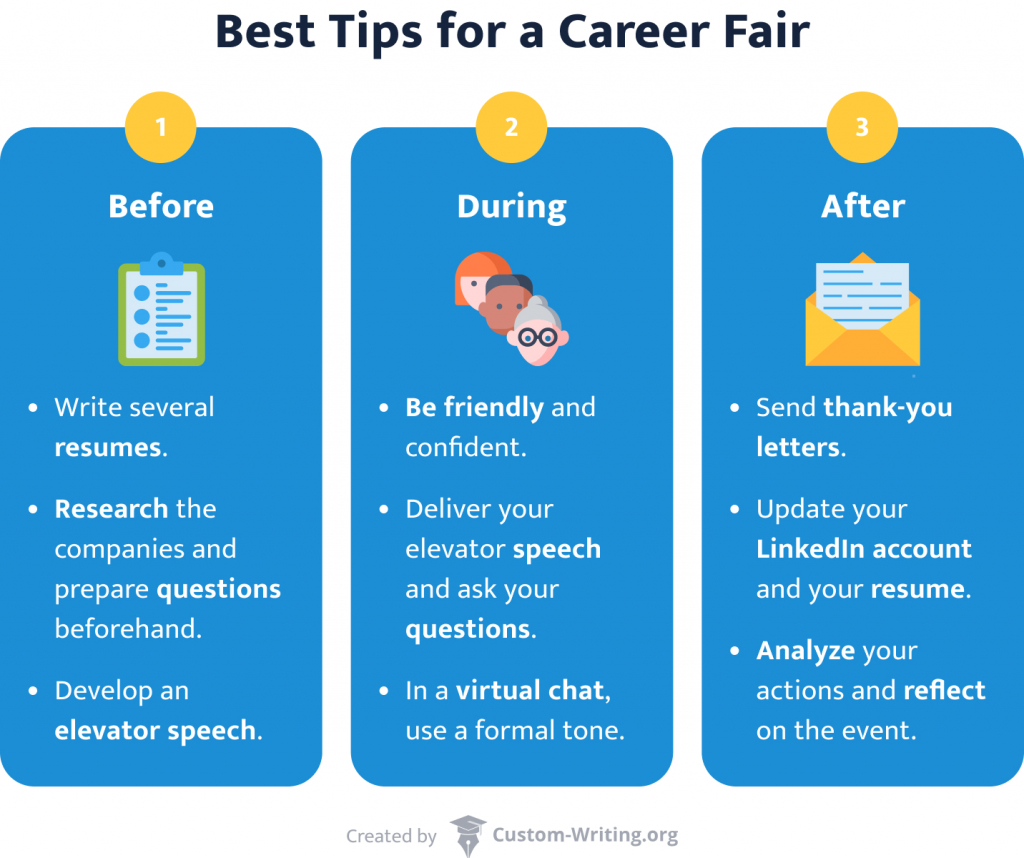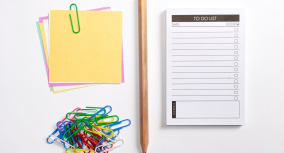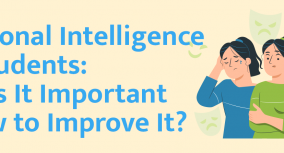One of the biggest problems for any student is not knowing what to do after they leave college. Career fairs are the best way to overcome this obstacle. They provide the opportunity to train your business and interpersonal skills, and also showcase both your strengths and weaknesses.
This article by Custom-Writing.org experts will answer all your questions about employment and internship fairs. Here you will find a detailed plan of actions you can take before, during, and after an event. We have also included important tips on how to interact with potential employers.
❓ What Is a Career Fair?
A career fair is an event where the representatives of various companies meet with students and potentially recruit them as their employees. They can also discuss opportunities for internships. Such events can be general (for students of all disciplines) and specialized (for engineering, biology, or art majors, for example). Employment fairs at universities are a great opportunity for students because employers are usually glad to hire people from their alma mater.
Why is Going to a Career Fair Beneficial?

- You get a chance to communicate with potential employers.
- You establish professional ties and collect contact details of possible employers.
- You find lots of job and internship opportunities.
- You learn which jobs are available to people with your credentials.
- You gather information about the industry you plan to enter as a specialist.
- You become an actual person to a future employer, not just a resume.
- You enhance your business communication skills.
- A representative could invite you to an interview, which is a great experience even if you don’t get a job offer.
- You can find a job in your degree field.
When to Start Attending Career Fairs
The answer is, the earlier, the better. Many people believe that career fairs are intended only for juniors and seniors, but that is not so. Everyone can benefit from attending such events.
- First-year students can explore opportunities in their field of study. For example, they can collect information about internships. They will also find out what specialties they will need when applying for a job in the future.
- Sophomores can seek part-time job positions, but the potential benefits from career fairs are generally the same as those of freshmen.
- Seniors can network with employers and seek a full-time job. They can visit any career fair, even if it is geared towards a different field. Recruiters are eager to meet students with diverse academic backgrounds.
What to Expect at a Career Fair
There is a misconception that you wasted your time at a career fair if you leave without a job offer. On the contrary, such luck is very sporadic. To avoid unnecessary frustration, aim at developing your networking skills, not finding an employer.
In-Person Career Fairs
- These are usually hosted on campus.
- Each registered employer sits in a booth or at a separate table. There, they communicate with students and give them printed materials or giveaways.
- If many students are eager to speak to a particular company, they will stand in line before the table or booth.
- A conversation with a potential employer lasts for 2 to 3 minutes. Too brief? Yes, but enough for you to talk about your credentials and share your resume. If you’re wondering how to ace a conversation at a career fair, there is a special section in this article.
- As a rule, submitting your resume is enough. But sometimes, you may be asked to apply online or send an email after the fair.
- Some employment and internship fairs use Handshake or similar software to share information about the employers attending the event. There, you can view the companies’ requirements to prepare for the interview beforehand.
Virtual Career Fairs
- Virtual career fairs are more targeted than in-person events because they prequalify all the registrants. For you, it means that the employers will have more time to dedicate to each candidate, as there will be no unqualified people.
- Each employer has a chat room. You can track your conversation, without getting side-tracked by other people waiting to talk to the company.
- You can communicate via audio and video connection or type messages.
- You avoid being judged by your appearance and clothes. The first impression is the strongest, and virtual events let the employers see you as a professional from the beginning.
- You get direct access to the hiring manager. If your chat conversation goes well, it can grow into an email correspondence or virtual interview.
- Virtual career fairs are great for specialists in digital areas of knowledge and those seeking remote employment.
- Virtual career fairs are cheaper. The attendance fee is lower, and you will have no travel expenses.
📄 How to Prepare for a Career Fair
Employment fairs give you a priceless opportunity to practice for your first job interview. To make the most of it, you have to prepare. Use our tips to get ready for a virtual or in-person event.

- Look through the list of employers registered for the fair. This way, you’ll avoid asking the annoying question, “What does your company do?”
- Short-list the companies you would like to approach at the event. Being organized will save you a lot of time.
- Think about what you can do for each employer on your list. You need an internship, but in what ways could they benefit from hiring you? This information will make you stand out during your conversations with the employers’ representatives.
- Make a resume that presents you in the best possible light. Read on to learn how to do it.
Writing a Resume
- Using the shortlist of companies you made while preparing for the event, divide them into several categories.
- Compose a resume that is targeted for each category. If you are an engineer, make up different versions of your resume for a large construction company and a national conglomerate. If you specialize in nursing, private clinics and older adults’ homes may require different skills. Keep this in mind when preparing your resumes.
- Make your resume as concise as possible. Employers usually only spend a few seconds looking through a resume. Highlight the most impressive experience and delete any irrelevant information.
- Bring any supporting documents with you. The representatives may ask you to show your certificates, CV, cover letter, professional portfolio, and transcripts. Prepare them in advance. Make the cover letter universal for any employer or at least easily editable.
Questions to Ask at a Career Fair
To demonstrate that you’re a qualified and educated person, prepare your questions beforehand. Here is some advice:
Writing an Elevator Speech
Imagine you step in an elevator and see the CEO of the company you want desperately to work for. You have 30 seconds to describe your goals and show off your strong points. What are you going to tell this person? This is what you should tell your potential employer at a career fair. Practice creating this speech by filling in the following table with your individual responses.
- Your name.
- Relevant experience and skills.
- Why you are interested in the company.
- Why you are a perfect candidate.
- Your questions for the employer.
Our advice is to thoroughly study the company in question and practice your speech several times.
Preparing for an In-Person Event
In addition to everything mentioned above, do the following:
- Plan the order in which you will visit each shortlisted employer.
- Print out several high-quality copies of your resume.
- Prepare your business cards (optional.)
- Decide on what you are going to wear, keeping in mind the dress code.
- Avoid using strong fragrances.
- Put all your documents into a business portfolio.
- If you need a printable pass or a name badge, prepare them.
- If necessary, book a hotel near the venue to avoid traffic jams.
Preparing for a Virtual Event
In addition to the above advice, do the following:
- Study the website that hosts the virtual employment fair so that you feel comfortable navigating it.
- Register for the event beforehand to avoid doing so in a hurry at the last moment.
- Upload your resume and photo (and any other requested documents.)
- If the event involves video calls, check if your camera and microphone function well.
- Dress appropriately for video calls.
🤝 Tips During a Career Fair
Can you get hired at an employment or internship fair? The answer is yes and no. The best result is that you create interest in yourself as a potential employee and learn how to apply for a job. To do so, use the following conversation tips.
Effective Communication Tips
Although the format of career fairs doesn’t necessarily include any job interviews, you will have a chance to present yourself. That is why communication is a critical skill that defines your success with potential employers. Show your interest in the given company; be friendly and proactive in the conversation. Ask thoughtful questions and describe what you can offer to the company. Also, choose an appropriate moment to hand in your resume.
How to Start a Conversation at a Career Fair
- Firm handshake. Introduce yourself. Mention your specialty and how many years you have been studying.
- Your elevator speech. Tell the representative how you learned about the company and why you would be excited to work for them. Show that you have prepared beforehand and know about the company’s expectations. Meanwhile, say only what you really think, not what you think they would like to hear. Just be yourself and do not hesitate.
- Any questions? Finish your elevator speech by asking the questions you have prepared before the event. Edit them, if necessary, according to the circumstances.
How to Close Conversations
Thank the representatives for their time. Ask them how to proceed with the application. What is the best way to keep in touch with them? Many companies have online application forms, but others will just require your resume. If applicable, give them your business card.
7 Tips During In-Person Career Fairs
- Take everything you need (resume, business cards, pass permit) and leave anything that you don’t need (overall clothes, backpack, etc.) at home or in your car.
- Be positive and friendly. Nobody can present your skills better than you. 60% of the success of your interactions depends on nonverbal communication. That is why you need to show your confidence through eye contact and smiles.
- Handshakes are a must.
- Arrive early. It will give you a chance to avoid waiting in long lines.
- Look through the event layout and spot the companies you plan to approach.
- Start with the companies that are the least interesting, leaving the priority organizations for the end. By the time you come up to them, you will be accustomed to the business environment of the fair.
- Don’t forget to ask thoughtful questions to show your engagement.
6 Tips During Virtual Career Fairs
- Sit comfortably in a place with a perfect internet connection and a calm background. A white wall with minor decorations will be fine.
- Remove any sources of distraction. Mute your phone.
- Answer every employer who invites you to chat.
- Before clicking the “Send” button, check your message for typos. Stick to a formal style. Never use colloquial language or abbreviations.
- During a video conversation, look into the camera to create eye contact with the company’s representative.
- Feel confident inviting the employers to chat with you. Don’t wait for a lucky moment; create it.
👔 After a Career Fair
When the event ends, and everyone leaves to the comfort of their homes, the best thing you can do is to write your potential employer. Here are some variants that you can do to follow-up:
- Write them a thank-you letter, mentioning a particular moment from your interaction with them at the fair. Then note the position you would be perfect for and explain why.
- Visit their website. If you find an online job application form there, fill it out and add a cover letter. Indicate that you’ve met the company’s representative at the fair and briefly describe your interaction with them.
- Call them to say that your conversation raised your interest. Reference some points you discussed at the event. Then suggest your candidature for a position for which you think you would be a perfect fit.
- Get in touch with the company via LinkedIn. Since your LinkedIn profile contains a resume, your photo, and other critical information for employment, it is the best option.
3 Things to Do After Attending a Career Fair
- Update your LinkedIn account. Even if your follow-up conversation is over the phone or email, HRs check the social networks of potential candidates.
- Correct your resume based on the feedback you received at the fair. Over time you will forget some details, so do it as soon as possible.
- Analyze the event and your experience.
- What could have been improved?
- Were you sufficiently prepared?
- If there was a problem or misunderstanding, think about how you would resolve it differently the next time.
- What did you learn about yourself and your potential employers?
We hope you’ve enjoyed reading our career fair advice. We’re sure you will pass the event with flying colors! You are making your first steps into the business world, and we wish you good luck in your career. Please share your experiences at career fairs in the commentaries below.











